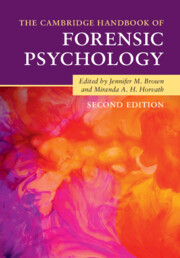Book contents
- The Cambridge Handbook of Forensic Psychology
- The Cambridge Handbook of Forensic Psychology
- Copyright page
- Dedication
- Contents
- Figures
- Tables
- Contributors
- Preface
- Forensic Psychology
- Part I Psychological Underpinnings
- Part II Psychology and Criminal Behaviour
- Part III Assessment
- Part IV Interventions
- Part V Civil Proceedings
- Part VI Professional Practices
- 6.1 Courtroom Testimony in Cases of Disputed Confessions
- 6.2 Evaluating Offending Behaviour Programmes in Prison and Probation
- 6.3 Working Effectively with Multicultural Offenders in a Clinical Context
- 6.4 Professional Training and Accreditation
- 6.5 Ethics
- 6.6 Forensic Case Formulation
- 6.7 Staff Supervision in Forensic Contexts
- Index
- References
6.4 - Professional Training and Accreditation
from Part VI - Professional Practices
Published online by Cambridge University Press: 02 December 2021
- The Cambridge Handbook of Forensic Psychology
- The Cambridge Handbook of Forensic Psychology
- Copyright page
- Dedication
- Contents
- Figures
- Tables
- Contributors
- Preface
- Forensic Psychology
- Part I Psychological Underpinnings
- Part II Psychology and Criminal Behaviour
- Part III Assessment
- Part IV Interventions
- Part V Civil Proceedings
- Part VI Professional Practices
- 6.1 Courtroom Testimony in Cases of Disputed Confessions
- 6.2 Evaluating Offending Behaviour Programmes in Prison and Probation
- 6.3 Working Effectively with Multicultural Offenders in a Clinical Context
- 6.4 Professional Training and Accreditation
- 6.5 Ethics
- 6.6 Forensic Case Formulation
- 6.7 Staff Supervision in Forensic Contexts
- Index
- References
Summary
This chapter overviews of the training pathways that are available to those who wish to practise forensic psychology in the UK, the United States, Australia, and Canada.It illustrates how different systems of professional regulation and graduate education have developed in each country, although training typically involves a period of undergraduate study (academic background) that is followed by forensic training (specialist knowledge) and supervision and training (professional practice). Current training programs vary in terms of scope and specialization, reflecting the wide range of different roles that forensic psychologists can fulfill but also creating significant challenges for those who have trained in one country but seek to practise in another. Although there is no universal route to a career in forensic psychology all of the training pathways emphasise the importance of obtaining skills and competencies for work in forensic settings.
- Type
- Chapter
- Information
- The Cambridge Handbook of Forensic Psychology , pp. 800 - 813Publisher: Cambridge University PressPrint publication year: 2021
References
- 1
- Cited by

